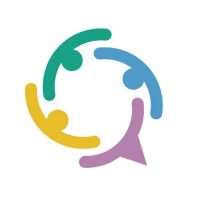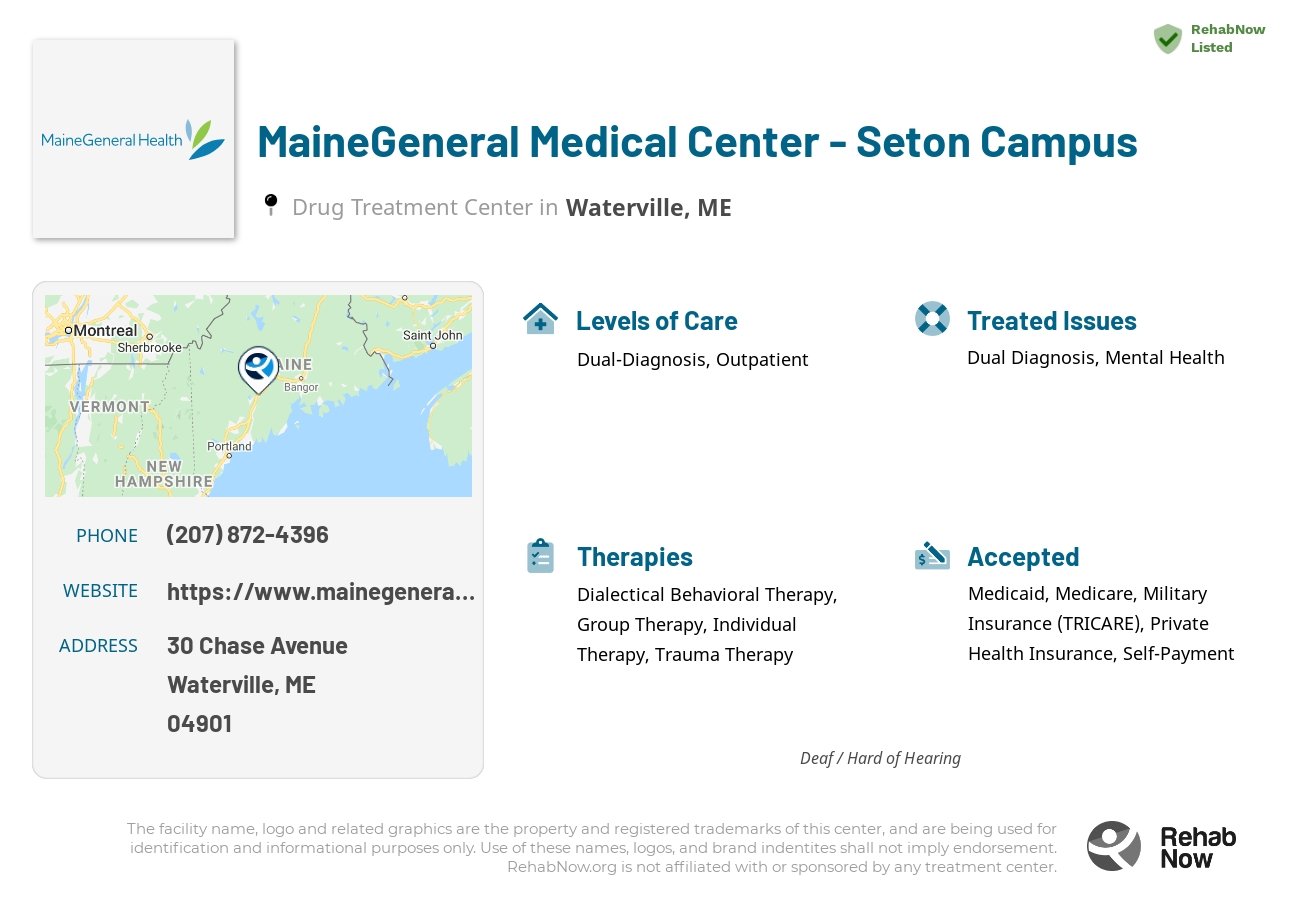MaineGeneral Medical Center - Seton Campus
Drug Rehab Center in Waterville, Maine
- Mental Health
- Dual Diagnosis
MaineGeneral Medical Center - Seton Campus in Waterville, Maine is an accredited treatment facility specializing in dual diagnosis, mental health issues, and addiction, offering various levels of care such as outpatient, inpatient, detoxification, and aftercare support.
About MaineGeneral Medical Center - Seton Campus in Maine
MaineGeneral Medical Center - Seton Campus in Waterville, Maine, is a private rehabilitation center focusing on dual diagnosis and mental health. This facility stands out for its comprehensive care and specialized attention to individuals dealing with both substance use and mental health disorders, offering a range of services tailored to promote recovery and well-being.
Accredited by the Joint Commission on Accreditation of Healthcare Organizations (JCAHO), MaineGeneral Medical Center - Seton Campus provides a high standard of care in treating individuals struggling with addiction and mental health issues. Their approach integrates various levels of care, including outpatient, inpatient, detoxification, and aftercare support, to offer a flexible and comprehensive treatment pathway.
- Specializes in the treatment of dual diagnosis, offering concurrent treatment for substance use and mental health disorders.
- Accredited by JCAHO, ensuring adherence to high standards of care and treatment practices.
- Offers a diverse range of services from outpatient to inpatient care, detoxification, and aftercare support, accommodating different needs and stages of recovery.
MaineGeneral Medical Center - Seton Campus provides care for individuals suffering from drug addiction, opioid addiction, substance abuse, and alcoholism. Their multifaceted treatment methods include therapeutic interventions, counseling, and evidence-based practices across various levels of care to support individuals on their journey to recovery.
Genders
Ages
Modality
Additional
Accreditations

JCAHO
Conditions and Issues Treated
Recovery is not simply about stopping drug use. Recovery is working with addiction while recovering mental health issues that are fueling the addiction in the first place.
Levels of Care Offered
This center offers a variety of custom treatment tailored to individual recovery. Currently available are Dual-Diagnosis, Outpatient, with additional therapies available as listed below.
Outpatient treatment is considered the lower intensity level of addiction treatment. It’s ideal for early phase addiction or lower intensity addictions. It may include weekly sessions instead of daily. It may include weekly sessions instead of daily. Peer group support, 12-step programs, and individual counseling may still be involved but at a lesser frequency than an intensive outpatient program. It is a good choice for someone who doesn’t need to go through a medically supervised detox and who has a supportive home environment. It requires motivation and dedication to commit to the program without constant monitoring.
Therapies & Programs
Individual therapy involves one-on-one sessions between the patient and therapist. It provides patients with a safe environment to openly discuss personal and sensitive issues with the therapist. They find the therapist as someone they can trust. Individual therapy aims to identify the core issues that would have led the patient to substance abuse and address them effectively. The therapist can develop patient-specific customized solutions through individual therapy, which aids speedier recovery.
Groups typically involve meetings with other recovering addicts who can relate to one another’s experiences. They might meet in person or online and typically focus on the process of staying sober rather than overcoming a specific addiction.
In these groups managed by MaineGeneral Medical Center - Seton Campus, addicts can build a sense of community and develop strong emotional connections with others who understand what they are going through. These beneficial relationships can help addicts overcome their cravings and prevent relapse at any point during the recovery process.
In general, trauma therapy is a clinical process that helps individuals deal with mental stress often caused by traumatic events. The therapist helps the person identify, understand, and work through the problem. This is done with the help of talking about it in group or one-on-one counseling sessions. Therapists use relaxation, role-playing, art, and music to help the person open up about what is bothering them.
There are many different types of trauma therapists, such as psychiatric nurses and counselors. Not everyone is a good candidate for this type of therapy; it is generally reserved for people who have recently experienced a traumatic event and struggle to get over it. It is often done for children, teenage victims of sexual assault, and war veterans.
Dialectical Behavior Therapy (DBT) is a type of therapy created in the late 1980s and early 1990s to help people with high rates of suicidal behavior. DBT helps people learn how to live a life that is no longer controlled by overwhelming emotions and urges. It is beneficial in treating drug addiction because it helps patients understand and cope with their cravings for drugs or alcohol rather than turning to those substances as a way of coping.
There is hope for people who are addicted to drugs and alcohol. Cognitive Behavioral Therapy (CBT) is the solution. CBT focuses on the underlying thoughts and behaviors that caused the addiction problem in the first place and may cause a relapse. This type of psychotherapy addresses negative feelings common in substance abuse disorders. It helps to change them by restructuring thought patterns. It’s about removing negative thoughts and providing long-term benefits while promoting self-awareness, self-control, and healthy ways to respond to negative thoughts. These sessions can be done by themselves or as part of combination therapy.
Payment Options Accepted
For specific insurance or payment methods please contact us.
Is your insurance accepted?
Ask an expert, call (888) 674-0062
MaineGeneral Associated Centers
Discover treatment facilities under the same provider.
- MaineGeneral in Augusta, ME
- MaineGeneral Health in Augusta, ME
- MaineGeneral Outpatient - Hathaway Creative Center in Waterville, ME
- Harold Alfond Center for Health in Augusta, ME
Learn More About MaineGeneral Centers
Additional Details
Specifics, location, and helpful extra information.
Waterville, Maine 4901 Phone Number(207) 872-4396 Meta DetailsUpdated April 15, 2024
Staff Verified
MaineGeneral Medical Center - Seton Campus Patient Reviews
There are no reviews yet. Be the first one to write one.
Waterville, Maine Addiction Information
Prescription opioid abuse is the most common form of substance abuse in Maine. More than 10% of these residents have also admitted to using prescription drugs for non-medical purposes. Between 2013 and 2014, 4 out of every 5 deaths in Maine were caused by illicit drugs. One in five high school students in Maine uses marijuana every single month.
Waterville is ranked in the top 20% of all cities in the country for drug abuse rates. Methamphetamines is the drug most commonly abused in Waterville, followed by prescription painkillers and marijuana. A combination of therapies and services is considered the safest and most effective way to get sober in Waterville, Maine.
Treatment in Nearby Cities
- Scarborough, ME (74.3 mi.)
- Surry, ME (57.2 mi.)
- Skowhegan, ME (15.2 mi.)
- Old Orchard Beach, ME (79.8 mi.)
- South China, ME (11.5 mi.)
Centers near MaineGeneral Medical Center - Seton Campus



The facility name, logo and brand are the property and registered trademarks of MaineGeneral Medical Center - Seton Campus, and are being used for identification and informational purposes only. Use of these names, logos and brands shall not imply endorsement. RehabNow.org is not affiliated with or sponsored by MaineGeneral Medical Center - Seton Campus.




